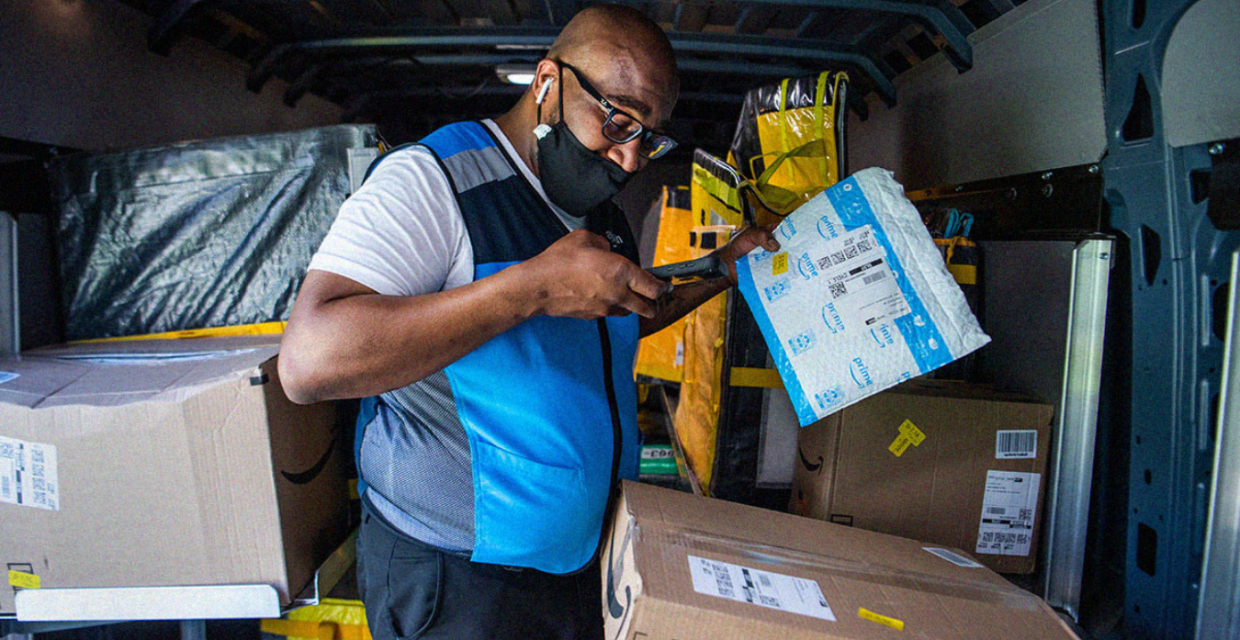
In October 2024, hundreds of workers in Victorville, CA marched with the Teamsters union in an effort to organize Amazon’s subcontracted delivery drivers. These workers, who are among the estimated 390,000 drivers delivering packages via the company’s 4,400 subcontractor “Delivery Service Partners (DSPs)”, joined a wave of activism among Amazon warehouse and delivery workers across the country.
Since 2022, DSP drivers in California, Georgia, Illinois, and New York have unionized—making demands for better working conditions, but facing hurdles obtaining their first contract. In Palmdale, CA, Amazon cut ties with its DSP shortly after workers formed their union, effectively firing the drivers for exercising their right to organize. In Atlanta, the company is refusing to bargain with drivers, in violation of federal labor law. Amazon claims it cannot be held liable for this union-busting because its subcontracting arrangement means none of the drivers are Amazon employees.
The Law is Clear: Amazon Delivery Workers are Amazon Employees
The legal issue at the heart of the conflict is whether Amazon is a joint employer of the delivery drivers alongside the DSPs. Under federal labor law, a company that uses subcontractor labor can still be an employer—and be required to bargain with any union organized by its employees—if it has the “right to control the essential terms and conditions” of subcontracted employees’ work.
Amazon insists that its DSP delivery drivers are not Amazon employees. But they deliver Amazon packages, in Amazon trucks, wearing Amazon attire, and their work is tightly controlled by the company. Amazon determines the daily routes drivers are assigned to, the number of deliveries to be completed each day, and delivery deadlines, while communicating this information directly to drivers through an app. This control is what makes Amazon’s promise of two-day delivery possible, but it’s also what makes the company a joint employer under federal law. As one driver put it, “Amazon controls every minute of our day. Amazon can no longer have all the benefits of their own fleet of drivers without the responsibilities that come with it.”
The NLRB Is Trying to Enforce the Law; Amazon is Saying the Agency Is Unconstitutional
The National Labor Relations Board (NLRB), the federal agency that enforces labor law, is poised to take action against the company. Two regional directors, who enforce labor law on behalf of the NLRB, recently filed formal complaints against Amazon after determining the company was liable as a joint employer. Still, the road ahead for the workers is long. The case first needs to be heard before an NLRB judge, after which Amazon could appeal any decision to the Board in Washington, DC, then onto a federal court of appeals, all the way to the Supreme Court.
Overshadowing this dispute is nationwide litigation brought by Amazon, and other large corporations, claiming the 90-year-old structure of the NLRB is unconstitutional. Amazon recently filed a federal lawsuit on these grounds, seeking to halt proceedings in the NLRB’s Palmdale case. The crux of their legal claim is that the Constitution only allows Congress to create federal agencies that are subordinate to the President under a “unitary executive” theory of the executive branch. In their view, the NLRB is too independent because Board members and judges cannot be fired by the President at will. With Trump back at the helm, and union-busting oligarchs like Elon Musk at his side, these legal arguments are more alarming.
Subcontracting Allows Companies Like Amazon to Skirt Obligations to Their Workers
The control the company has over its subcontracted workers matters for another reason—if working conditions are really controlled by Amazon, then unionized delivery workers won’t be able to win meaningful changes in bargaining with the DSP alone.
Driver wages, hours, and safety conditions are all set by Amazon—so Amazon needs to be at the negotiating table if workers want to win a raise in their union contract.
These kinds of problems aren’t new to labor law. Employers in manufacturing, warehousing, fast food, and logistics use subcontracting, franchising, and temporary staffing agencies to outsource liability to their workers. In 2019, McDonalds dodged a union campaign and escaped accountability for retaliating against union organizers—arguing that its service workers were franchisee employees with no legal ties to McDonalds. And FedEx avoided paying subcontracted drivers minimum wage and overtime pay, settling the case in 2015, after years of litigation.
Contracted workers make up more than 26 million people—around one in six U.S. workers—and are subjected to tactics like the DSP program to shift power away from workers. Even as government agencies work to catch up to the rise of insidious contracting techniques, there are even more worker rights violations that are never seen in court. An overwhelming majority of private sector workers (80%) are required to sign away their rights in mandatory arbitration clauses, allowing employers to pocket $9.2 billion in stolen wages each year.
Conclusion
These employer tactics and the organizing campaigns they have spawned pose a critical question for the future of the labor movement. Can large employers like Amazon continue to shield themselves from their obligations to workers with subcontracting arrangements? For workers to prevail in their fight to make the essential jobs at the nation’s second largest private employer good jobs, the Board needs to recognize Amazon as a joint employer. However, an NLRB decision will not go far enough. While it may be difficult in the current political climate, the labor movement must continue working towards comprehensive labor law reform, like the PRO Act, to build the worker power needed to hold corporations like Amazon responsible.
Related to
The Latest News
All newsMarch Jobs Report: Immigrant Workers Power a Steady Economy, Full Impact of Trump Policies Yet to Come

News Release
NELP Urges New York Governor Kathy Hochul to Delay Flawed Transition of Medicaid CDPAP Homecare Program to Avoid Harm to Clients and Workers

News Release
Marketplace: Why Does the Government Have 6 Unemployment Rates?

Press Clips


